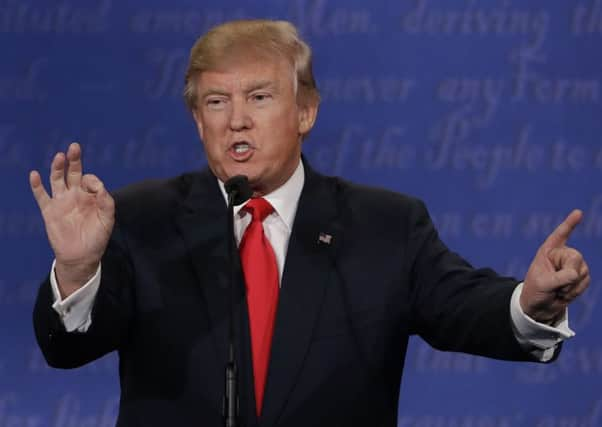Leader comment: Trump lining US up for white-knuckle ride


One of the burning issues that surrounded Mr Trump’s candidacy for the most powerful office in the world – one which has continued to provoke questions weeks after his victory – is what will become of his business empire?
He is a president with a unique backstory and a global corporate reach. With interests and holdings in countries as far afield such Azerbaijan, Egypt, India, Saudi Arabia, South Korea and Turkey, there have been long-standing and legitimate concerns that Mr Trump’s porfolio could clash with, and indeed, shape future US foreign policy.
Advertisement
Hide AdAdvertisement
Hide AdHe has been reluctant to address this clear conflict of interest, and at times downright dismissive of those who raised it. Yesterday, however, heralded an apparent shift in attitude, when in true idiosyncratic style, he declared his intentions in a series of posts on the social networking site, Twitter.
Over the course of four messages, Mr Trump indicated he intends to “leave” his businesses in order to “fully focus” on running the country. Legal documents, he added, were being drawn up which would take him “completely out of business operations”.
There were few other details, although the billionaire said he would provide more information at a New York conference alongside his children due to take place in a fortnight’s time.
His decision to confront this conflict of interest – both real and perceived – is welcome, but its success depends entirely on the model Mr Trump and his advisers advocate. He has previously spoken of setting up a blind trust that would allow his adult children to run his companies – a solution that does not adequately remove him from the equation. As Kenneth Gross, a former associate general counsel at the Federal Election Commission, told The Scotsman earlier this month: “When assets are put in a blind trust, the holder of the assets does not get a sudden case of amnesia.”
The unique powers of the presidency means Mr Trump is under no legal obligation to step back from his businesses, but the credibility of his administration – and the success of his businesses, including in Scotland – depend on it. He must spell out exactly how the arrangement will guarantee his corporate interests are not bound up with his political ambitions, otherwise consensus will prove elusive.
That is already a rare commodity where Mr Trump is concerned. The cabinet he is starting to assemble looks like it will be a gamble, with none of the appointments indicative of conservative gravitas, balance and inclusion.
There are those who feared Mr Trump’s ideological vaccuum would set the US on course for a white knuckle ride over the next four years. Those fears are looking increasingly well-founded. This may be his best chance to disprove them.